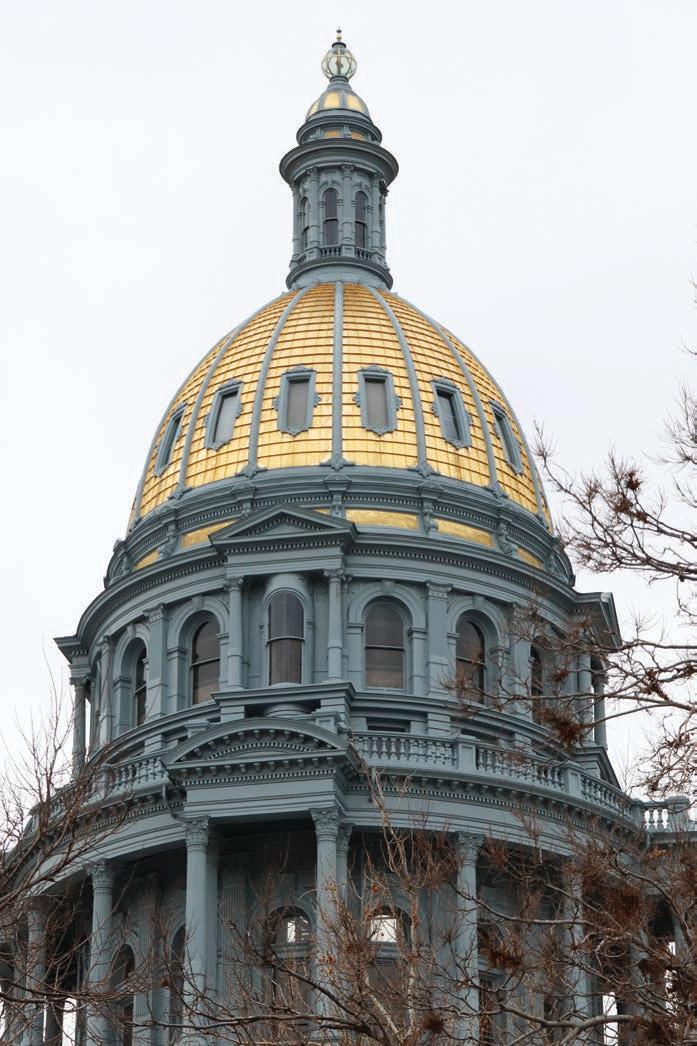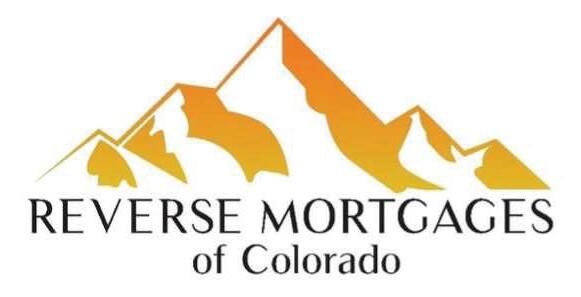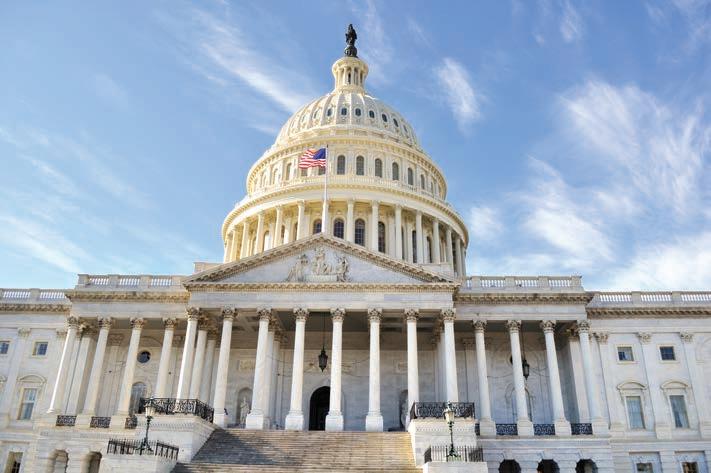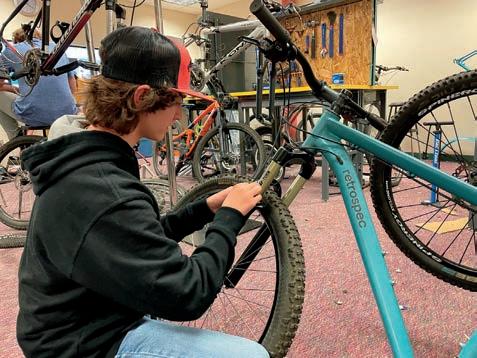
4 minute read
Democrats unveil e ort to shield abortion, transgender patients
Prevents out-of-state consequences
BY JESSE PAUL THE COLORADO SUN
Colorado Democrats on March 9 unveiled a trio of bills aimed at ensuring abortion and gendera rming care in Colorado isn’t subject to legal action initiated in other states, as well as reshaping health insurance regulations around the procedures and prohibiting deceptive advertising by anti-abortion pregnancy centers.
e measures, which haven’t been introduced yet, come a year after the legislature passed a bill enshrining abortion access in state law.
at happened just before the U.S. Supreme Court overturned Roe v. Wade, the 1973 ruling protecting the right to an abortion without excessive government restriction.
Since Roe was overturned, conservative areas of the country have passed abortion restrictions, leading to an in ux of people coming to Colorado to terminate their pregnancies. Colorado has almost no abortion restrictions. Republican state legislatures and governors have also begun enacting laws limiting transgender care for young people.
Republicans are likely to ght the Colorado bills, but they are in the minority in the legislature and have few tools to stop the policy changes.
Here’s what the legislation would do, according to bill fact sheets provided to e Colorado Sun and interviews with the measures’ sponsors:
Blocking out-of-state legal action e most substantive of the three measures takes aim at abortion restrictions passed in other states in the wake of Roe v. Wade being overturned, as well as laws passed by other states limiting gender-a rming care for transgender people. e bill would mandate that Colorado not recognize criminal prosecutions initiated in other states for people who receive, provide or assist in access to an abortion or gendera rming care in Colorado. at would explicitly outlaw abortionrelated arrests, extraditions, search warrants and court summons or subpoenas. e bill would also bar state employees from participating or assisting in interstate investigations into abortion and gender-a rming care, and it would prohibit wiretapping related to an investigation of abortion or gender-a rming care.




Additionally, abortion- and gender-a rming-care-related lawsuits wouldn’t be recognized or enforced by the state under the measure.
State Sen. Julie Gonzales, a Denver Democrat and a lead sponsor of the bill, said the idea behind the legislation is to prevent investigations into things that are legal in Colorado.
“Gender-a rming and reproductive health care services are lawful here in Colorado, so why would


Colorado law enforcement agencies, courts or our governor investigate activity that is legal in this state?” Gonzales said.
Gov. Jared Polis signed an execu- tive order in July prohibiting the state from assisting in criminal or civil abortion actions initiated in other states. e measure would also require Colorado prisons to provide pregnant people with information on abortion access. Additionally, state medical boards would be prohibited under the measure from leveling professional consequences against people who provide or assist in abortions and gender-a rming care.
Prohibiting deceptive advertising e second measure would prohibit “deceptive advertising,” namely around abortion pill reversal. e legislation is targeted toward anti-abortion pregnancy centers, but would apply to any organization purporting to o er pregnancy services.

It would also be considered deceptive advertising to falsely purport to o er abortion services or Plan B.
“ ese centers open up near college campuses and in communities of color in order to persuade people to make decisions without understanding their full range of medically accurate reproductive health care,” said Sen. Faith Winter, a Westminster Democrat and one of the bill’s lead sponsors.

Additionally, prescribing, o ering or facilitating abortion pill reversal would become “unprofessional conduct for licensed, registered or certi ed health care providers.”
Some states require abortion providers to tell their patients that they can reverse the procedure. e
American College of Obstetricians and Gynecologists says claims about abortion-reversal treatment “are not based in science” and that reversal procedures are unproven and unethical.
Health insurance policy changes e third and nal bill deals with health insurance policy.
Advocates say it would reduce surprise billing and remove patient cost sharing for treatment of sexually transmitted infections, as well as sterilization and abortion care.
It would also:
Create a state fund that providers may on behalf of patients receiving abortion or reproductive health services who are concerned about con dentiality
• Ensure that the exemption from step therapy and prior authorization requirements for HIV medications applies to medications prescribed by any authorized provider, not only pharmacists
• Include family planning related services in the existing state reproductive health care program
• Clarify that Medicaid’s nonemergency medical transportation service can support patient transportation to abortions e Colorado Sun is a partner in the Colorado News Conservancy, owner of Colorado Community Media.
• Modernize a 1971 Courts and Court Procedures statute to specify there is no minimum age restriction for people seeking contraceptives. is story is from e Colorado Sun, a journalist-owned news outlet based in Denver and covering the state. For more, and to support e Colorado Sun, visit coloradosun.com.




The Colorado Department of Public Health and Environment and the EPA are updating the Clear Creek Superfund Site’s Community Involvement Plan. A community involvement plan is a site-specific strategy to determine the best way to facilitate two-way communication between the agencies and the community throughout the Superfund cleanup process.
We are inviting community members and stakeholders to take part in interviews in March 2023 to help guide the plan. You can sign up for an interview at bit.ly/40K0rC1 or by contacting Shannon Bauman at shannon.bauman@state.co.us or 303.692.3421. We are offering virtual and in-person interviews as well as Spanish interpretation upon request. Interview responses will be pooled and not attributed to individuals.
Site background:

The Clear Creek Superfund Site was listed on the National Priorities List in 1983, making it a Superfund site. The Study Area encompasses the approximately 400 square mile Clear Creek watershed. The area has been impacted by heavy metals from historic mining operations, including impacts to aquatic life and potentially human health. Cleanup to date has been focused primarily on addressing the impacts to surface water and includes: treatment of point-source discharges and contaminated water; waste pile stabilization, capping, off-site disposal and diversion of run-on water; development of a repository to consolidate and manage mine waste rock and tailings; andother activities. Cleanup activities and investigations at the site are ongoing.
Site information is available at: https://cdphe.colorado.gov/central-city-clear-creek.











